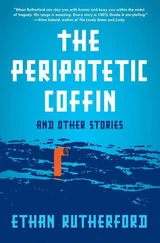He spent most of his time with Harry and Ferdie. It was not easy for them. They lived in a very orderly way but he was not an orderly person. He also seemed physically too large for the flat, and in fact broke two of the dining room chairs just by sitting on them. And they had difficulty feeding him for he could not be satisfied on the meals Ferdie cooked for Harry's delicate digestion (which had never recovered from India). The Nawab had developed a sweet tooth and, unable to obtain Indian sweetmeats in London, had got into the habit of eating a great number of cream pastries. His afternoons were usually spent in a popular restaurant — a palatial hall with marble pillars not unlike the Palace at Khatm. Three times in the course of the afternoon a lady in a long tea gown played selections on a multicoloured organ; and listening to her with pleasure, the Nawab would turn to Harry: "How nicely she plays — just like Olivia." He had always been quite unmusical.
Like his father, he had in recent years become very fond of reciting Persian and Urdu couplets, especially those that dealt, as most of them did, with the transience of worldly glory. He would point to himself as a living illustration of this theme. Besides the question of increased allowance, his most urgent problem at the time was that of the state jewels which were missing. The government of Khatm was accusing the Begum of having purloined them: to — which she answered with spirit that she had taken nothing that was not her own. This case was indeed destined to linger on for many years and, after Independence, became the problem of the Government of India who tried to bring a case against the Begum. However, by that time both she and the jewels were safely in New York.
The Nawab became excited when he spoke of the harassment offered to his mother. He suffered from high blood pressure, and when he got too worked up, Harry would try and calm him down. "You'll have a fit of apoplexy and die", Harry warned him. (In fact this did happen — but not for another fifteen years and then it was in New York, in the Park Avenue apartment of the ancient Begum and in her arms.) When Harry said that, the Nawab always laughed: he truly did laugh at the thought of dying. He liked to tell a story of something that had happened in Khatm about a year after Harry's departure. The gang of dacoits with whom the Nawab had been suspected of associating had been rounded up by the (reformed) police force. Some of them had been killed in direct encounters, others had been captured and brought to trial. These were all sentenced to death for various murders and dacoities committed over the years. The Nawab visited them in prison many times and found them cheerful and resigned right up till the end. In fact, he spent their last night with them, watched them eat their last meal, play their last game of cards, lay themselves down to sleep. They actually slept — it was he who remained awake. He accompanied them to the place of execution and joined. them in their last prayers. He watched the noose being placed around their necks and stayed till the very last moment. At that last moment, one of them — Tikku Ram, a man of very high caste — suddenly turned to the hangman and began to ask "Are you a-?" but could not finish because the hangman had slipped the hood over his face. The missing word was probably "chamar"·- he was worried about the caste of the hangman who was performing this last intimate function for him. It was apparently his only worry at that moment of departure. The Nawab commended this attitude and said he hoped he would be able to emulate its spirit when his turn came.
There are no glimpses of Olivia in later years. The Nawab did not speak about her very much: she had become as private a topic to him as the Begum. He never said anything about the way she was and lived up there in X. Perhaps he never thought about it, just assuming she was all right with the comforts he took care to provide for her. She herself gave no clues either. She still corresponded with Marcia but, unlike her letters from Satipur, the letters from X were short and quite unrevealing. Also very rare — at first she wrote two or three times a year, but even that grew less. She never wrote after the Nawab's death, though she survived him by six years.
Marcia told Harry that she and Olivia were very much alike. Harry thought this may have been true when they were young — Marcia too was small and frail though dark where Olivia had been blonde — but by the time he got to know Marcia he had difficulty in reconciling her with his memories of Olivia. Marcia drank and smoked too much, and laughed shrilly. She was talkative, nervous, and had twice taken an overdose of sleeping tablets. She said that where she and Olivia were most alike was in their temperament which was passionate. She claimed she could understand Olivia completely. Of course, she said, their tastes differed — for instance, Marcia never could understand what Olivia had seen in Douglas, as far as she, Marcia, was concerned, he was just a stick and she was not in the least surprised that Olivia should have got bored to death with him and gone off with someone more interesting. Later, when she met the Nawab in London, Marcia said that he was more interesting than Douglas, though again, personally speaking, not her type. But the fact that her and Olivia's tastes differed did not detract from the similarity of their temperaments; nor of their characters — which were prepared to follow the dictates of those temperaments wherever they might lead them. When Harry asked the Nawab whether Marcia was like Olivia, the Nawab said "Oh no no no no!" without a moment's hesitation. The idea seemed to strike him as simultaneously ludicrous and horrifying.
What was she like? How did she live? Looking around her house above X, it strikes me that perhaps she did not live so very differently from the way she had done in Satipur, and might have done in London. The rooms were arranged in her style, she still played the same pieces of piano music. That much I learned from the remains of her house — though not much else. I still cannot imagine what she thought about all those years, or how she became. Unfortunately it was raining heavily all the time I was there, so I couldn’t see what she looked out on as she sat in the window at her embroidery frame. It might make a difference to know that.
I have taken a room in the town of X and live there in the same way I did in Satipur. The town is the same too — the houses are ramshackle, the alleys intricate and narrow; only here everything is on a slope so that it looks as if the whole town might slide down the mountain any minute. Bits of it do slide down from time to time, especially now during the rains; and the mountains themselves crumble off in chunks which hurtle down and block the sodden roads. I’m impatient for it to stop raining because I want to move on, go higher up. I keep looking up all the time, but everything remains hidden. Unable to see, I imagine mountain peaks higher than any I’ve ever dreamed of; the snow on them is also whiter than all other snow — so white it is luminous and shines against a sky which is of a deeper blue than any yet known to me. That is what I expect to see. Perhaps it is also what Olivia saw: the view — or vision — that filled her eyes all those years and suffused her soul.
I rarely look down. Sometimes, when the rains stop, the mist in the valley swirls about and afterwards the air is so drenched with moisture that the birds seem to swim about in it and the trees wave like sea weed. I think it will be a long time before I go down again. First of course I’m going to have my baby. There is a sort of ashram further up and I’m told they might take me in. I have seen some of the swamis from the ashram when they come down to the bazaar to do their shopping. They are very much respected in the town because of the good lives they lead. They are completely dedicated to studying the philosophy of those ancient writings that had their birth up in the highest heights of these mountains I cannot yet see. The swamis are cheerful men and they laugh and joke in booming voices with the people in the bazaar. I'm told that any sincere seeker can go up to the ashram, and they will allow one to stay for as long as one wants. Only most people come down again quite soon because of the cold and the austere living conditions.
Читать дальше












